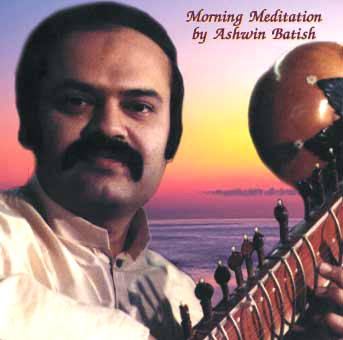Ragmala TV Live
Ragmala on MySpaceRagmala Radio Live
Press arrow to listen to live streaming broadcast by the Batish Institute of Indian Music and Fine Arts email info@batish.com or call 1-800-RAG-MALA. International (831) 423-1699
|

Sitar Power Review - India Inc.For sitarist Ashwin Batish, the power of music comes from a cultural fusionby Martin Zyla Just when you thought everything in the musical world was identified, labeled, and filed away, here comes Indian sitarist Ashwin Batish to ruffle your sensibilities. Born in Bombay, India, some forty four years ago and settled today in Santa Cruz, California, Batish approaches the world's music like a chef approaches a good mulligan stew: a little east, a little west, and everything in between. His claim to fame rests not only with his masterful work on sitar and tabla but in an adventurous spirit that lovingly fuses traditional Indian ragas with jazz, hip-hop, samba, country .... the list goes on. "This kind of stuff has not been touched by anybody," Batish proudly proclaims. I think they were trying some experiments in the past when George Harrison and Ravi Shankar got involved together. But as a HUGE fan of both those guys I always wanted them to take it to the extreme, which I did not hear happen. Coming from a younger generation, spending a little extra time in the West, I think this is my exuberance in being a part of both cultures that's really coming out in this music." Batish began playing the sitar at age twelve and three years latter began to study seriously with his father, Pt. Shiv Dayal Batish, a celebrated Indian vocalist and an accomplished musician on several instruments, including sitar, violin, and tabla. The elder Batish had been successful writing and performing soundtracks for Indian films and, in addition, was spending a good deal of time in England, where he worked on the soundtrack for the Beatles film Help! In the area of classical music, Batish worked formally with his father until age 21, but he says that the learning process between the two has never really stopped. "His grasp of Indian music is totally mind-boggling. Everyday he has something different for me. If I learnt a few percent of what he knows, I think I'd be a happy man." Beyond the classical realm, Batish discovered rock and roll, and lists some of his early influences as Cliff Richards, Elvis Presley, and the Beatles. "As a young kid I would go to parties and listen to their music. I even had long Beatle hair and pointed shoes because I wanted to look like one of these guys." But while Batish admired the music of rock groups, he "never ventured into the Western form." "I became a stuck-up person," he admits. "I started to believe that the ultimate sound was the classical sound, and I felt compromising in trying to take my sitar to a level where I would have to play with rock and rollers. I came to America, and this is where everything changed." Batish, the classical snob, began to open up to the experiences of musicians around him. Before long he had wired his sitar, picked up an amp, and started sitting in with local bands, playing songs like his own "Bombay Boogie," the eventual headliner on his first fusion release, Sitar Power. Opening up his sound has given Batish an endless appetite for music everywhere and an appreciation for the symbiotic relationship between seemingly different cultural styles. His compositions are often comprised of Western rhythmic foundations, layered with raga modes, the raga being a conveyance of emotions in its various constructs. For Batish, a musical composition contains more than just the nuts and bolts of technical knowledge. It is the result of life experiences. This article apppeared in "On-the-Town" the arts and entertainment magazine of West Michigan, April 1996 issue. Ashwin was intervied when on tour in Grand Rapids. He performed in concert at radio station WYCE FM's Global Grooves concert series. The concert was held at Aquinas College's Kretschmer Hall, April 23rd, 1996. It is re-printed here by permission. For additional information about Batish recordings and publications, contact: Batish Records, 1310 Mission street, Santa Cruz, Ca 95060 Tel: (831) 423-1699 / Fax: (831) 423-5172
|